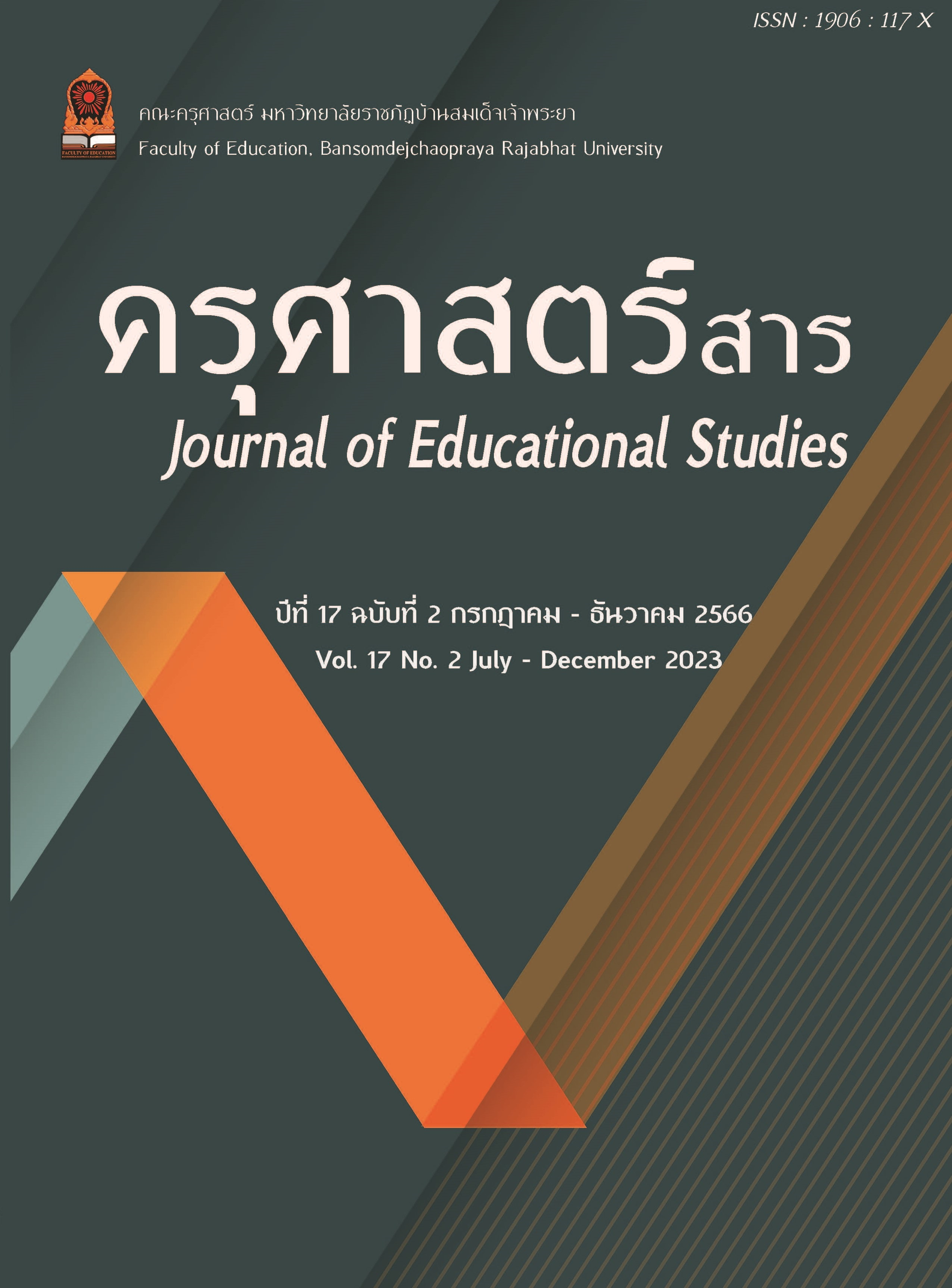Small-Sized Schools: Challenges and Opportunities in Educational Management
Keywords:
Small-Sized Schools, Challenges and Opportunities, Educational ManagementAbstract
The objectives of this article are 1) to study the current management situation of small-sized schools in Thailand. The study reveals that the Ministry of Education and the Basic Education Commission have policies and guidelines for managing small-sized schools through five approaches: Approach 1 involves the closure or consolidation of schools with nearby quality schools. Approach 2 focuses on multi-grade classroom teaching. Approach 3 emphasizes technology-driven learning management. Approach 4 deals with self-governing small-sized schools. Approach 5 involves collaborative networked school management. These policies, guidelines, operational measures, and educational quality enhancement strategies have been set by the Basic Education Commission to ensure effective local-level management of small-sized schools. The principles of decentralization, local consideration, and decision-making are central, and 2) to propose a guideline for managing small-sized schools appropriately, considering the school context, and applying School-Based Management principles. Using the systemic approach of the PDCA quality cycle in workflow management, comprising four steps: 1) Preparation and awareness-building, 2) Implementation, 3) Monitoring, inspection, and evaluation, and 4) Refinement and development. Effective management and operation of small-sized schools require collaboration from all stakeholders, including communities, parents, school committees, local administrative organizations, school networks, and involved parties. Additionally, educational innovation is crucial for enhancing the quality of small-sized schools. These innovations should be tailored to the specific problems faced by schools and align with their contexts. Such opportunities allow schools to develop themselves and ensure that students have a quality education that aligns with community needs, contributing to sustainable educational development.
Downloads
References
กระทรวงศึกษาธิการ. (2562). แผนบริหารจัดการโรงเรียนขนาดเล็ก ปีการศึกษา 2562-2565. สืบค้นจาก http://www.ska2.go.th/home/data/report/25630519_140915_5359.pdf
กระทรวงศึกษาธิการ. (2563). แผนบริหารจัดการโรงเรียนขนาดเล็ก. สืบค้นจาก https://drive.google.com/file/d/1YWMkEoFcgW10aja9fai_6ovMPy7S-Auz/view
กระทรวงศึกษาธิการ. (2565). รมว.ศธ.ตอบกระทู้ถาม “การควบรวมโรงเรียนขนาดเล็ก และการจัดสรรงบประมาณด้านบุคลากรทางการศึกษา”. สืบค้นจาก https://ops.moe.go.th/360smallschool-merger/
คณะกรรมาธิการขับเคลื่อนการปฏิรูปประเทศด้านการศึกษา. (2559). รายงานของสภาขับเคลื่อนการปฏิรูปประเทศด้านการศึกษา เรื่อง การบริหารจัดการศึกษาโรงเรียนขนาดเล็ก. สืบค้นจาก https://www.parliament.go.th/ewtadmin/ewt/parliament_parcy/download/usergroup_disaster/5-10.pdf
Beach D, Johansson M, Öhrn E, et al. (2019) Rurality and education relations: Metrocentricity and local values in rural communities and rural schools. European Educational Research Journal, 18(1): 19–33.
Deming, E. W. (1986). Out of the Crisis. Cambridge, MA: Massachusetts Institute of Technology, Centre for advanced study.
Fargas-Malet and Bagley. (2022). Is small beautiful? A scoping review of 21st-century research on small rural schools in Europe. European Educational Research Journal, 21(5), 822-844. DOI: 10.1177/14749041211022202.
Karlberg-Granlund, G. (2019). Exploring the challenge of working in a small school and community: Uncovering hidden tensions. Journal of Rural Studies, 72: 293–305.
Mansor, A. N., Hamid, A. H. A., Medina, N. I., Vikaraman, S. S., Abdul Wahab, J. L., Mohd Nor, M. Y., & Alias, B. S. (2022). Challenges and strategies in managing small schools: A case study in Perak, Malaysia. Educational Management Administration & Leadership, 50(4), 694-710.
OBEC Channel. (3 สิงหาคม 2565). การบริหารจัดการโรงเรียนขนาดเล็กและโรงเรียนคุณภาพ 4 ภาค โดย ดร.ภูธร จันทะหงษ์ ปุณยจรัสธำรง ผู้อำนวยการสำนักพัฒนานวัตกรรมการจัดการศึกษา [Video file]. สืบค้นจาก https://www.youtube.com/watch?v=wEHQsVLdgpA
Pettersson, G & Ström, K. (2019). Professional collaboration between class teachers and special educators in Swedish rural schools. British Journal of Special Education, 46(2): 180.
Raggl A (2015) Teaching and learning in small rural primary schools in Austria and Switzerland –opportunities and challenges from teachers’ and students’ perspectives. International Journal of Educational Research, 74: 127–135.
Raggl, A. (2019). Small Rural Schools in Austria: Potentials and Challenges. In: Jahnke, H., Kramer, C., Meusburger, P. (eds) Geographies of Schooling. Knowledge and Space, vol 14. Springer, Cham. https://doi.org/10.1007/978-3-030-18799-6_12
Raggl, A. (2020). Small rural primary schools in Austria. Places of Innovation? In: Gristy C, Hargreaves L, Kučerová SR (eds). Educational Research and Schooling in Rural Europe: An Engagement with Changing Patterns of Education, Space, and Place. Charlotte: Information Age Publishing, pp.199–216.
The 101. Word. (2566). ปักหมุดความเหลื่อมล้ำ แก้โจทย์โรงเรียนขนาดเล็ก. สืบค้นจาก https://www.the101.world/inequality-in-small-school/
Tsiakkiros, A., Pashiardis, P. (2002). The management of small primary schools: The case of Cyprus. Leadership & Policy in Schools, 1(1): 72.
Wildy, H., Siguräardóttir, S.M., & Faulkner, R. (2014). Leading the small rural school in Iceland and Australia: Building leadership capacity. Educational Management Administration & Leadership, 42(4 Supplement): 104–118.
Downloads
Published
How to Cite
Issue
Section
License

This work is licensed under a Creative Commons Attribution-NonCommercial-NoDerivatives 4.0 International License.
บทความที่ได้รับการตีพิมพ์เป็นลิขสิทธิ์ของคณะครุศาสตร์ มหาวิทยาลัยราชภัฏบ้านสมเด็จเจ้าพระยา
ข้อความที่ปรากฏในบทความแต่ละเรื่องในวารสารวิชาการเล่มนี้เป็นความคิดเห็นส่วนตัวของผู้เขียนแต่ละท่านไม่เกี่ยวข้องกับมหาวิทยาลัยราชภัฏบ้านสมเด็จเจ้าพระยา และคณาจารย์ท่านอื่นๆในมหาวิทยาลัยฯ แต่อย่างใด ความรับผิดชอบองค์ประกอบทั้งหมดของบทความแต่ละเรื่องเป็นของผู้เขียนแต่ละท่าน หากมีความผิดพลาดใดๆ ผู้เขียนแต่ละท่านจะรับผิดชอบบทความของตนเอง



